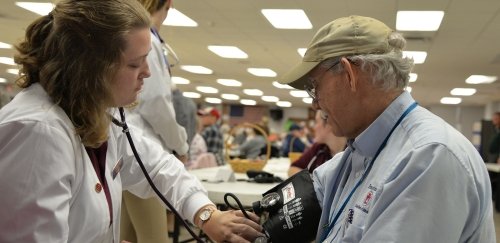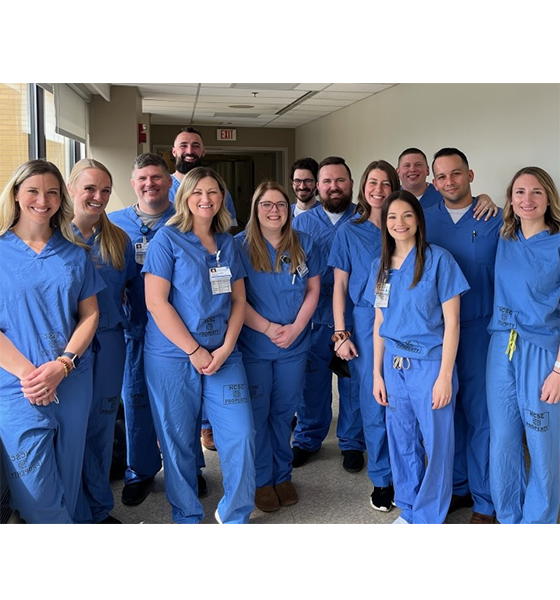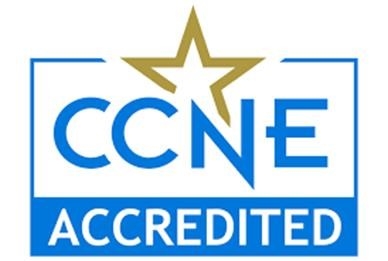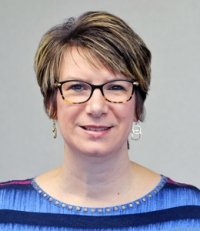

Nurse Practitioner (MSN)
Whether you choose to specialize in Adult-Gerontology Primary Care or Family Primary Care, earning your Nurse Practitioner MSN degree from Bloomsburg's nationally recognized nursing program will prepare you to be a leader in healthcare across the lifespan of your patients.
- Degrees & Offerings
-
- MSN
- Format Option(s)
-
- Hybrid (Online + In-Person Field Experience)
- Department
- College
- Program Contact
-
Chair of Graduate Nursing, Director of Nurse Practitioner Programs
Virtual Information Session
You're invited to the upcoming MSN Nurse Practitioner Virtual Information Session on Thursday, May 16 at 7 p.m. on Zoom! Join program faculty as they preview coursework, high-impact experiences, concentrations, job outlook, career options, and the admission process! Graduate application fees will be waived for those in attendance!
Nurse Practitioner Program Details
- 2 Concentrations - Adult-Gerontology and Family/Individual Across the Life Span.
- Flexible Start Dates - Applications are accepted for the Spring, Summer, and Fall semesters.
- Coursework - MSN Nurse Practitioner Adult-Gerontology program includes 15 courses (45 credits). MSN Nurse Practitioner Family/Individual Across the Life Span program includes 18 courses (54 credits).
- Program Delivery - Core courses are asynchronous online. Clinical courses are synchronous online with minimal on-campus requirements.
- Flexible Coursework - Curriculum is built with working nurses in mind.
- Program Focus - Program's primary focus is on preparing primary care clinicians.
- Faculty Practitioners - Program faculty are all practicing Nurse Practitioners .
Courses and Curriculum
- Adult/Gerontology Primary Care Nurse Practitioner: Part-Time / Full-Time
- Family Nurse Practitioner: Part-Time / Full-Time
- Nursing Administration (MSN and MSN/MBA): Part-Time / Full-Time
- Nursing Informatics: Part-Time / Full-Time
- Public Health Nursing: Part-Time / Full-Time
- Public Health Nursing - School Nurse: Part-Time / Full-Time
*Please see the CU degree requirements effective Fall 2023. All enrolled students can also review their degree program requirements and track progress to degree completion in Degree Works.
- The patient population focus for the Adult Gerontology Primary Care Nurse Practitioner (AGPCNP) includes adolescents (above 12 years of age), young to middle age adults and older adults. Our AGPCNP graduates will have the capabilities to practice in community and hospital based primary care clinics, in patient’s homes, in sub-acute/skilled nursing facilities, and in long-term care settings. The AGPCNP works inter-professionally with other members of the health care team.
- A full-time, part-time, and RN-BSN-MSN are offered for the Adult Gerontology Primary Care Nurse Practitioner. The full time program is completed in two years (5 semesters). The Graduate Core Curriculum provides students from any specialty area advanced knowledge in nursing theory and research, community health, epidemiology, evidenced- based practice and socio-cultural issues. Programs with advanced practice role preparation include lifespan physical assessment, pathophysiology, and pharmacology.
- The Adult Gerontology Primary Care Nurse Practitioner program has met the American Nurses Credentialing Center’s (ANCC’s) certification eligibility educational requirements. Students who complete this program have the educational preparation to sit for the ANCC national certification in this role and population. Applicants must also meet any additional eligibility criteria in effect when they apply for certification. Graduates of the program are also eligible for national certification through examination through the American Academy of Nurse Practitioner that is Practitioner, or the American Nursing Credentialing Center.
I. Core Courses: (24 Credits)
- NURSING 501 Theoretical Bases for Role Development in Advanced Nursing Practice (3 crs.)
- NURSING 502 Epidemiology: Concepts for Advanced Nursing Practice (3 crs.)
- NURSING 503 Bases of Research for Advanced Nursing Practice (3 crs.)
- NURSING 504 Pathophysiology Across the Lifespan for the Advanced Practice Nurse (3 crs.)
- NURSING 507 Pharmacology Across the Lifespan for the Advanced Practice Nurse (3 crs.)
- NURSING 508 Lifespan Health Assessment and Promotion for Advanced Nursing Practice (6 crs.) (60 clinical hours)
- NURSING 520 Community Assessment and Planning (3 crs.)
II. Clinical Sequence: (21 Credits)
- NURSING 515 Diagnosis and Management of Adult and Aged I (6 crs.) (200 clinical hours)
- NURSING 529 Comprehensive Assessment of the Older Adult (3 crs.) (60 clinical hours)
- NURSING 516 Diagnosis and Management of Adult and Aged II (6 crs.) (200 clinical hours)
- NURSING 534 Adult-Gerontology Primary Care Nurse Practitioner Practicum and Seminar (6 crs.)
- TOTAL CREDITS = 45
- The patient populations focus for the Family Nurse Practitioner (FNP) includes children, adolescents, adults, and older and frail older adults. Our program prepares the graduate to value collaborative, family-centered care as well as the interaction among the physical, emotional, mental, and sociocultural systems of patients to meet the individual healthcare needs as well as those of the family. In addition, the program has a strong emphasis on meeting the needs of the community, underserved, high-risk, and multi-cultural populations. Graduates of the program can provide primary health care in a variety of primary care settings. The FNP works inter-professionally with other members of the health care team.
- Full-time, part-time, and RN-BSN-MSN are offered for the Family Nurse Practitioner. The full-time program is completed in two and half years (six semesters). The Graduate Core Curriculum provides students from any specialty area advanced knowledge in nursing theory and research, community health, epidemiology, evidenced-based practice, and socio-cultural issues. Programs with advanced practice role preparation include lifespan physical assessment, pathophysiology, and pharmacology.
- Advanced pathophysiology and advanced pharmacology are also online courses where the advanced physical assessment course is offered as an on-campus course with an extensive laboratory experience in the assessment of the client. The core clinical courses provide the student with the skill set and knowledge to provide health promotion, disease prevention, assessment, diagnosis, and management across the lifespan to patients and families who present with both acute and multiple chronic conditions. Practice-based learning experiences provide the student with opportunities to apply the theory and skills learned in the classroom setting in their role as primary care providers.
- The Family Nurse Practitioner program has met the American Nurses Credentialing Center’s (ANCC’s) certification eligibility educational requirements. Students who complete this program have the educational preparation to sit for the ANCC national certification in this role and population. Applicants must also meet any additional eligibility criteria in effect when they apply for certification. Graduates of the program are also eligible for national certification through examination through the American Academy of Nurse Practitioner and the American Nurses Credentialing Center.
I. Core Courses: (27 Credits)
- NURSING 501 Theoretical Bases for Role Development in Advanced Nursing Practice (3 crs.)
- NURSING 502 Epidemiology: Concepts for Advanced Nursing Practice (3 crs.)
- NURSING 503 Bases of Research for Advanced Nursing Practice (3 crs.)
- NURSING 504 Pathophysiology Across the Lifespan for the Advanced Practice Nurse (3 crs.)
- NURSING 507 Pharmacology Across the Lifespan for the Advanced Practice Nurse (3 crs.)
- NURSING 508 Lifespan Health Assessment and Promotion for Advanced Nursing Practice (6 crs.) (60 clinical hours)
- NURSING 520 Community Assessment and Planning (3 crs.)
- NURSING 522 Family Theory Across the Lifespan (3 crs.)
II. Clinical Sequence: (27 Credits)
- NURSING 515 Diagnosis and Management of the Adult & Aged I (6 crs.) (200 clinical hours)
- NURSING 516 Diagnosis and Management of the Adult & Aged II (6 crs) (200 clinical hours)
- NURSING 517 Diagnosis and Management of Pregnant Women and Children
(6 crs.) - NURSING 529 Comprehensive Assessment of the Older Adult (3 crs.) (60 clinical hours)
- NURSING 541 Family/Individual Across the Lifespan Nurse Practitioner Practicum and Seminar (6 crs.)
- TOTAL CREDITS = 54
The Nurse Practitioner program admits students on a rolling basis. Completed applications should be submitted to the Office of Graduate at least two weeks prior to the start of the semester in which a student is applying.
Completed application packets consist of the following information (all application materials should be mailed directly to the Office of Graduate Admissions, 161 Arts & Administration Building, Bloomsburg, PA 17815 or electronically to gradadmissions@commonwealthu.edu).
- Graduate school application and fee
- Official transcripts from all post-secondary schools attended
- Copy of current, unencumbered professional nursing license
- Resume which includes description of professional nursing and clinical experience
- Career Goals
- One completed recommendation form and 2 additional names with contact information
- One year of current acute care experience prior to starting clinical rotations. Acute care experience NOT required upon submission of the application. Interviews with the Graduate Nursing Department Admissions Committee will be conducted via a rolling admission process. For more information contact Jennifer Sheaffer, DNP CRNP, Chairperson, Graduate Nursing.
- Q: Do I need professional experience in order to be admitted?
A: No - Students do not need 1 year of acute primary care experience in order to be considered for admission. However, students do need to have 1 year of acute primary care experience prior to starting clinical rotations in the MSN program. - Q: What career opportunities will a master's in nurse practitioner open up?
A: By completing our MSN Nurse Practitioner degree, you're more likely to advance your scope of practice, have increased level of autonomy, and increase your salary potential. - Q: How is the program delivered?
A: Core courses are offered 100% online and clinical courses are offered in hybrid format. Program is available in part-time and full-time formats. - Q: When can I start?
A: Applications are accepted for the Spring, Summer, and Fall semesters. - Q: Do I need to take the GRE in order to apply?
A. No - the GRE is not required for admission.
The Husky Difference


Mission and Philosophy
Recognized as a leading accredited undergraduate and graduate level nursing program, Commonwealth University prepares future nurses for a wide range of careers in critical care, obstetrics, pediatrics, rehabilitation, trauma, home care, and other clinical specialties and case management.

CCNE Accredited
Commission on Collegiate Nursing Education 655 K Street, NW, Suite 750 Washington, DC 20001 P: (202) 887-6791 F: (202) 887-8476

PA Coalition of Nurse Practitioners
PCNP is the state organization that promotes and protects the practice of more than 7,500 Certified Registered Nurse Practitioners (CRNPs) in Pennsylvania. Formed in the 1980's by only 3 forward thinking NPs, PCNP now has 18 Regional groups and over 1,350 members! Each regional group offers networking opportunities and has a representative on the PCNP Executive Board that meets quarterly to discuss issues and set organizational goals. Member dues are used to support our central office, executive staff and maintain a Government Relations Specialist who represents us in Harrisburg.

Out-of-state licensure and certification
Professional licensure laws and regulations vary from state to state and are subject to change without notice. A Commonwealth University program that leads to state licensure in PA may not meet all requirements in another state. Please review each state’s licensing board contact information and whether BU’s MSN-NP programs provide all educational prerequisites towards licensure in a specific state. If you're planning to pursue a professional credential in a state other than PA, it's highly recommended you contact the appropriate state licensing agency to seek guidance and verify the provided information prior to starting a program. Visit the state authorization page for details.
Faculty
Applying to Graduate Programs
Apply
-
Application Process
Review the step-by-step application process for graduate school at Commonwealth University. (Note that Physician Assistant has a specific application through CASPA which can be located on the program webpage)
-
Apply Now
Begin your application online. ( Note: This link applies to most graduate programs, but if applying to Physician Assistant, please access the CASPA link on the program webpage).
-
Contact Us
If you have questions, we have answers. Contact us today!
Explore More
-
Grad Assistantships
Help finance your grad degree. Gain professional experience. Grow your network.
-
Tuition and Fees
Earning an advanced degree is an investment in your future. See just how affordable BU's Grad School can be for you.
-
Financial Aid
Our Financial Aid team is your guide to navigating the aid process for your graduate degree at BU.
Nurse Practitioner Faculty

Chair of Graduate Nursing, Director of Nurse Practitioner Programs

Assistant Professor of Nursing



